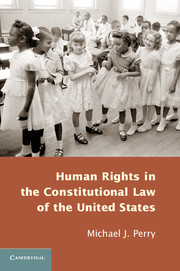Book contents
- Frontmatter
- Dedication
- Contents
- About the Author
- Introduction: Human Rights in the Constitutional Law of the United States
- Part I The Morality of Human Rights
- 1 The Internationalization of Human Rights
- 2 What is a “Human Right”?
- 3 The Normative Ground of Human Rights
- Part II The Constitutional Morality of the United States
- Concluding Note
- Index
- References
3 - The Normative Ground of Human Rights
Published online by Cambridge University Press: 05 July 2013
- Frontmatter
- Dedication
- Contents
- About the Author
- Introduction: Human Rights in the Constitutional Law of the United States
- Part I The Morality of Human Rights
- 1 The Internationalization of Human Rights
- 2 What is a “Human Right”?
- 3 The Normative Ground of Human Rights
- Part II The Constitutional Morality of the United States
- Concluding Note
- Index
- References
Summary
All human beings are born free and equal in dignity and rights. They are endowed with reason and conscience and should act towards one another in a spirit of brotherhood.
– Article 1, Universal Declaration of Human RightsThe fundamental imperative articulated in the foundational human rights document of our time – the Universal Declaration of Human Rights (UDHR) – directs “all human beings” to “act towards one another in a spirit of brotherhood.” Johannes Morsink recounts that Rene Cassin, the French delegate, in drafting Article 1 as he did,
had wanted to stress “the fundamental principle of the unity of the human race” because Hitler had “started by asserting the inequality of men before attacking their liberties.” Later on, Cassin reiterated the point that “the authors of that Article had wished to indicate the unity of the human race regardless of frontiers, as opposed to theories like those of Hitler.” When someone in the third committee observed that these principles were too well known and did not need to be stated again, Cassin quickly responded that the argument “was invalid in light of recent events. Within the preceding years,” he said, “millions of men had lost their lives, precisely because those principles had been ruthlessly flouted.” He thought it “was essential that the UN should again proclaim to mankind those principles which had come so close to extinction and should refute the abominable doctrine of fascism.”
- Type
- Chapter
- Information
- Publisher: Cambridge University PressPrint publication year: 2013

